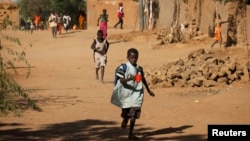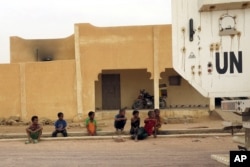The United Nations Children’s Fund (UNICEF) says ongoing fighting in northern Mali is keeping more than 380,000 children out of school.
Calling education the best hope for the future, the U.N. group says children between the ages of 7 and 15 in particular have been deprived of their education for more than four years, as children are fearful of attending and parents are reluctant to send them.
UNICEF representative in Mali Fran Equiza said more than 280 schools in the conflict areas in are closed, and that many educational facilitieds have been damaged, destroyed, looted or occupied by the warring parties.
Speaking via telephone line from the capital, Bamako, Equiza said that in Kidal, one of the worst hit areas, he managed to visit one functioning school, about 80 percent of schools in the region remain closed.
“I entered in one of the classrooms and I was really shocked about what I saw," Equiza said. "I saw a completely overcrowded school and a classroom with more than 100 boys and girls down there.”
Shortage of teachers
Equiza also said the violence has triggered a teachers shortage, and that nearly 600 educators have fled the conflict zones or are no longer reporting to work because of insecurity.
Another problem: Unexploded mines and other remnants of war. According to Equiza, more than 100 children have been killed or maimed by these weapons since 2012. He said UNICEF is working to inform the children, their teachers and parents of the dangers.
“Our programs include mine awareness because it is fundamental for the children," he said. "So, the curriculum is complemented with specific training for the children on mine awareness.”
UNICEF has just launched a two-year campaign in Mali called “Every Child Counts.” It aims to get more children into schools through greater community involvement.
The campaign will include training for 2,000 teachers, provide school supplies for 100,000 children and offer special programs to help children who have missed one or more years of school catch up with their education.








